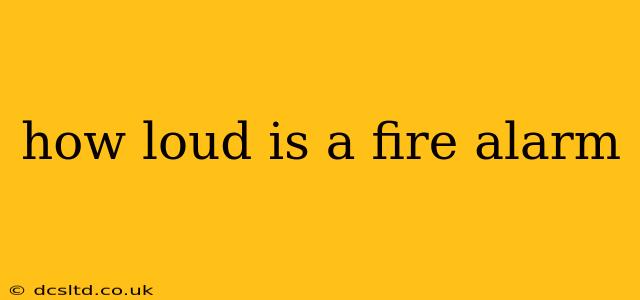How Loud is a Fire Alarm? Decibel Levels, Regulations, and Your Hearing
Fire alarms are designed to be loud – incredibly loud – for a very good reason: to alert you to a potentially life-threatening emergency. But just how loud are they, and what are the implications for your hearing? This article delves into the decibel levels of fire alarms, relevant regulations, and steps to protect your hearing.
What is the decibel level of a fire alarm?
The loudness of a fire alarm is measured in decibels (dB). Most standard fire alarms operate at a sound pressure level between 85 and 110 dB. To put this in perspective, normal conversation is around 60 dB, while a busy street can reach 80 dB. A fire alarm is significantly louder than these everyday sounds. The exact decibel level can vary depending on the type of alarm, its age, and its distance from the listener.
Are fire alarms required to be a certain decibel level?
Yes, there are regulations regarding the minimum sound pressure level of fire alarms. These regulations vary by country and even by region within a country. However, most jurisdictions mandate a minimum decibel level to ensure the alarm is easily heard, even over other noises in a home or building. These regulations often specify different requirements for residential versus commercial applications. You should check with your local fire marshal or building codes for the specific requirements in your area.
How loud is a fire alarm compared to other common sounds?
To illustrate just how loud a fire alarm is, let's compare it to other everyday sounds:
- Normal conversation: 60 dB
- Busy street traffic: 80 dB
- Power mower: 90 dB
- Fire alarm: 85-110 dB
- Rock concert: 110-120 dB
- Jet engine: 140 dB
As you can see, a fire alarm is comparable in loudness to a power mower or a rock concert. Prolonged exposure to these levels can be harmful to your hearing.
Can fire alarms damage your hearing?
While a brief exposure to the sound of a fire alarm is unlikely to cause permanent hearing damage, prolonged exposure to such high decibel levels certainly can. If your fire alarm is malfunctioning and constantly sounding, you should address the issue immediately to protect your hearing.
What should I do if my fire alarm is too loud?
If you find your fire alarm excessively loud or bothersome, there are several options:
- Check the alarm's placement: Sometimes, the placement of the alarm can amplify its sound. Try repositioning it to a less resonant location.
- Consider a different type of alarm: Some alarms are designed to be less jarring, offering a different tone or frequency.
- Address any underlying issues: If the alarm is constantly sounding due to a malfunction, have it repaired or replaced promptly. A constantly beeping alarm is not only disruptive but also a safety concern.
Why are fire alarms so loud?
The high decibel level of fire alarms is crucial for ensuring that everyone in the building is alerted to the danger, even if they are sleeping or have hearing impairments. The loudness ensures the alarm can be heard over other household noises, significantly increasing the chances of a timely and safe evacuation.
In conclusion, fire alarms are designed to be loud and for good reason. Understanding their decibel levels and taking steps to protect your hearing in case of malfunction are crucial considerations for both safety and well-being. Remember to regularly test your fire alarms and address any issues promptly.
